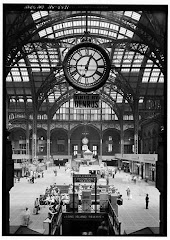
All is going well with the writing, but I've been meaning to do this for a while and I wanted to dash this off before I packed up some stuff on my desk (including the magazine I scanned this image from), so here it is.
I guess it's probably impossible even to think about writing a musical set largely in 1961 without acknowledging arguably the musical of 1961 (there's a song early in my first act that I have already started referring to as "the I Believe In You song"). Early in the process, I bought a bunch of period magazines, partly for research purposes but mostly just to get me in the mood, and this December '61 edition of the late, lamented (by me, at least) Theater Arts seemed like a must-have.
I quote their review in full because (a) it's short and (b) why not?
"Here’s the happiest news of the season: a musical comedy in which everything works — in which, for a wonder, our pleasure accumulates all evening long and the stage is even more charged with merriment at the last curtain than it was at the first. This model musical is called How to Succeed in Business With out Really Trying, and it chronicles the rapid rise of a very tough but beguiling young man, J. Pierpont Finch, from resident window washer to chairman of the board of the World Wide Wickets Company. When we encounter Finch, he is perched on his window-washer’s scaffold, studiously poring over a book by Shepherd Mead that bears the same title as the musical—Mr. Mead actually exists and so does his book, and it’s a fairly funny one — and preparing to follow the book’s scandalously corrupt recommendations from start to finish. The increasingly complicated jams that young Finch gets into and then out of provide an ingenious and outrageous series of Lanier Davis episodes, and though good musical-comedy books are as rare as civic virtue between elections, the story line here is both strong and light and proves able to support a considerable weight of satire without sagging. As Finch, in direct contradiction to the title of this venal pilgrim’s progress, fights his way fiercely onward and upward, the more conspicuous arts and artifacts of American Big Business get a nice, sharp going over-the coffee break, the office party, the cleaning woman’s sorry nightly feather dusting, the brisk intramural lingo, the advertising presentation that presents nothing, and even the executive wash room, where, one gathers, careers are made and broken with terrifying speed! All of the many diverse talents involved in How to Succeed mingle and merge into a handsome family likeness that amounts almost to genius. The Frank Loesser songs—among them “The Company Way,” “Happy to Keep His Dinner Warm” and “A Secretary is Not a Toy” — make comments no less witty and incisive than the dialogue, which is j by Jack Weinstock, Willie Gilbert and Abe Burrows, who has directed the whole slam-bang affair in a splendidly broad, slam-bang fashion. Bob Fosse’s staging, Robert Fletcher’s costumes, and Hugh Lambert’s choreography are of a piece with Robert Randolph’s nervy, lively scenery, which conjures up a Mies building full of Loewy-like objects that one sees, at a second glance, are merely desks and chairs. Everything is vivid, playful and more or less preposterous; its purpose is to exhilarate us, and it does.
"Robert Morse is the wily Finch to perfection. As animated as silly putty and with a leer that manages to be both dastardly and disarming, young Mr. Morse bounds through what might have been a rather repellent part with such ardor and, where necessary, such a lack of conviction that we forgive him his worst crimes and silently beg him to commit still more horrendous ones. Charles Nelson Reilly plays the equally difficult part of Bud Frump, the boss’s nephew; he stands in Finch’s way and must be destroyed, and though his destruction would in any event give us no pain, since he is as ambitious and unscrupulous as his rival, it is much to Mr. Reilly’s credit that we don’t wish him to suffer too much. (He ends up, of course, on the window-washer’s scaffold that Finch has vacated, and his misery as he dangles there has a certain charm.) Rudy Vallee, marvelously undisguised by a heavy pince-nez and costumes out of John Held, Jr., plays the president of World Wide Wickets with relish, and why not?—it’s a grand, silly part, and when Mr. Vallee cups his hands at his mouth in imitation of a megaphone, one doesn’t have to be a strict contemporary of the Maine Stein Song to find him both moving and hilarious. As for the young ladies of the cast, they are decorative and, in all but one case, decorous. The exception is a hard-as-nails hoyden called Hedy La Rue, who takes dictation in the longest longhand you can imagine and has a voice like fingernails on slate. How Virginia Martin carries on that screeching night after night I don’t know."
For those interested in this type of thing, other shows reviewed in this issue include A Shot In The Dark, Milk and Honey and Purlie Victorious.
It also contains an article about the death of satire (!) entitled "Satire's Last Stand" (apparently it was on its way out even then. Go figure. Yes, I am being satirical), which includes some not entirely kindly comments on the subject of a brand-new, Chicago-based phenomenon, something called "The Second City." And another about the potential for increasing public participation in television, "a medium now at the crossroads."
I wonder how that worked out?

